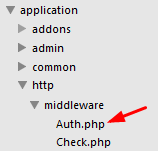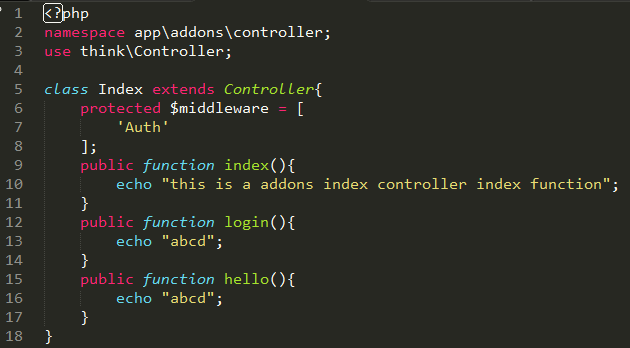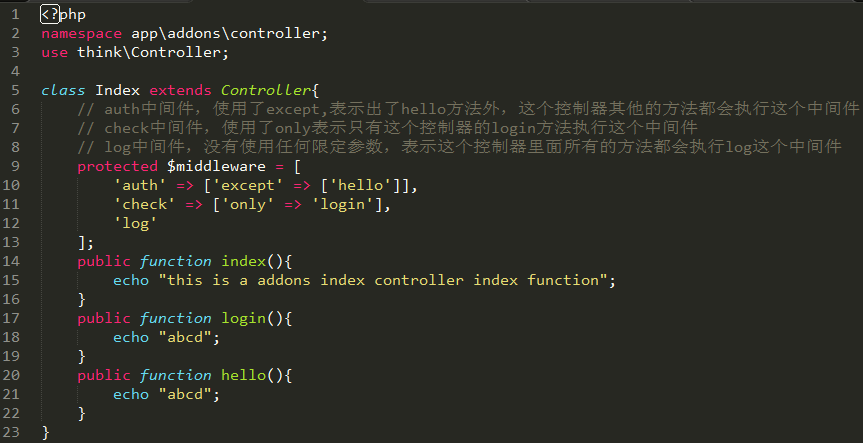中间件主要用于拦截或过滤应用的HTTP请求,并进行必要的业务处理。
定义中间件:可以通过命令行指令快速生成中间件
php think make:middleware Check

这个指令会 application/http/middleware目录下面生成一个Check中间件。

<?php namespace apphttpmiddleware; class Check { public function handle($request, Closure $next) { } }
中间件的入口执行必须是handle方法,而且第一个参数是Request,第二个参数闭包:

1、前置中间件
前置中间件:主要在请求阶段实现,例如判断登录状态,以及访问权限等等。
<?php namespace apphttpmiddleware; class Before{ public function handle($request, Closure $next){ // 添加中间件执行代码 return $next($request); } }
2、后置中间件
后置中间件:主要是在请求之后实现,例如:写日志、请求分析等等。
<?php namespace apphttpmiddleware; class After{ public function handle($request, Closure $next){ $response = $next($request); // 添加中间件执行代码 return $response; } }
注册使用中间件:
在tp5.1的配置文件 config/middleware.php中 【可以预先注册中间件,增加别名标识】 可用于增加别名
return[ 'check' => apphttpmiddlewareCheck:class, 'auth' => apphttpmiddlewareAuth:class, 'log' => apphttpmiddlewareLog:class ]
但是这个注册使用中间,如果定义了中间件的命名空间即可省略注册:
return [ // 默认中间件命名空间 'default_namespace' => 'app\http\middleware\', ];
使用中间件:
Route::rule('hello/:name','hello')->middleware('Auth');
或者使用完整的路径:
Route::rule('hello/:name','hello')->middleware(apphttpmiddlewareAuth::class);
支持使用多个中间件:
Route::rule('hello/:name','hello')->middleware(['Auth', 'Check']);
我的尝试:
第一:在路由上使用

在middleware目录新建 Auth.php
<?php namespace apphttpmiddleware; class Auth{ /** * 中间件拦截 */ public function handle($request, Closure $next) { // 添加中间件执行代码 if(2 > 1){ return error('中间件拦截'); } return $next($request); } }
在路由上使用:
Route::get('addons/abc','addons/index/index')->middleware('Auth');
第二:在控制器中使用
在控制器中使用,配置的路由规则为:
Route::get('addons/abc','addons/index/index');
然后在控制器:定义 protected $middleware

代码示例:
<?php namespace appaddonscontroller; use thinkController; class Index extends Controller{ protected $middleware = [ 'Auth' ]; public function index(){ echo "this is a addons index controller index function"; } public function login(){ echo "abcd"; } public function hello(){ echo "abcd"; } }
这样使用中间件,意味着在这个控制器下的所有方法都需要Auth中间件的验证,解决方法:
处理情况:控制器中的某几个方法,不需要中间件来验证。
例如:
auth中间件,使用了except,表示出了hello方法外,这个控制器其他的方法都会执行这个中间件
check中间件,使用了only表示只有这个控制器的login方法执行这个中间件
log中间件,没有使用任何限定参数,表示这个控制器里面所有的方法都会执行log这个中间件

<?php namespace appaddonscontroller; use thinkController; class Index extends Controller{ // auth中间件,使用了except,表示出了hello方法外,这个控制器其他的方法都会执行这个中间件 // check中间件,使用了only表示只有这个控制器的login方法执行这个中间件 // log中间件,没有使用任何限定参数,表示这个控制器里面所有的方法都会执行log这个中间件 protected $middleware = [ 'auth' => ['except' => ['hello']], 'check' => ['only' => 'login'], 'log' ]; public function index(){ echo "this is a addons index controller index function"; } public function login(){ echo "abcd"; } public function hello(){ echo "abcd"; } }
这就是中间件的一些使用方法。